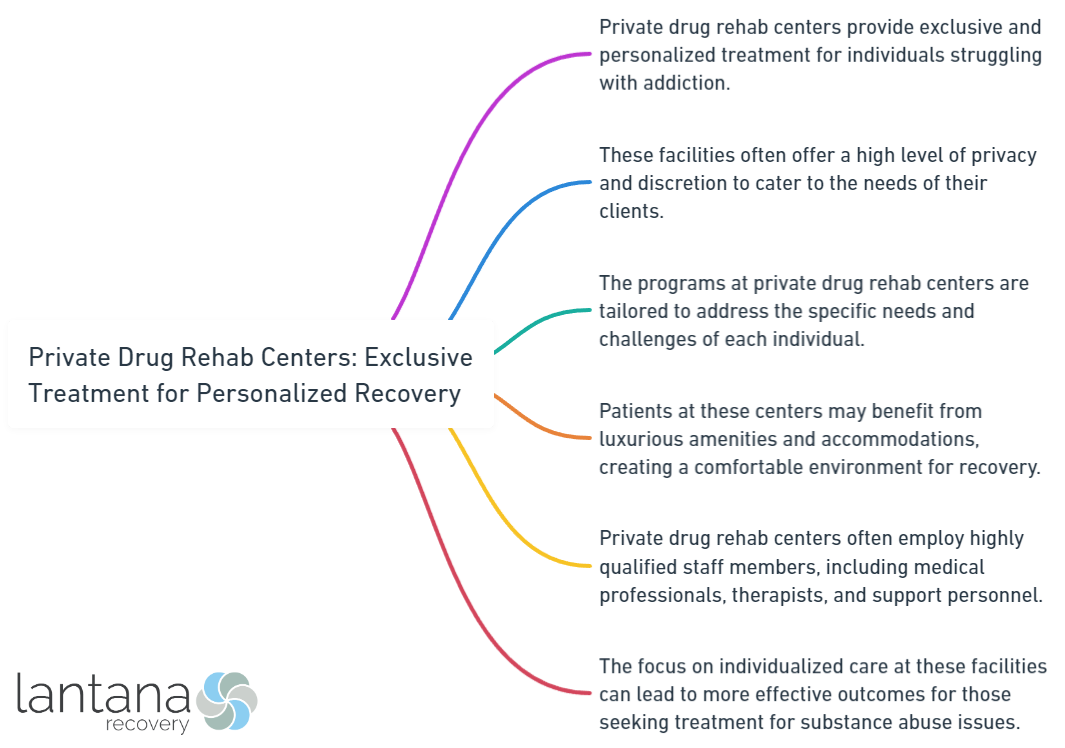Private Drug Rehab Centers offer a unique and exclusive approach to addiction treatment, providing personalized recovery programs tailored to individual needs. These centers provide a comfortable and luxurious environment while maintaining privacy and confidentiality. With a holistic approach to recovery, they offer a range of services such as detoxification programs, psychotherapy and counseling, medication-assisted treatment, and alternative therapies. When choosing a private drug rehab center, considerations such as accreditation, cost, location, staff qualifications, and aftercare support should be taken into account. The success rates and testimonials of these centers demonstrate their effectiveness in helping individuals achieve long-term recovery. If you are seeking a high-quality and individualized approach to addiction treatment, private drug rehab centers may be the right choice for you.

What Are Private Drug Rehab Centers?
Private drug rehab centers are specialized facilities that provide exclusive and individualized treatment for individuals with substance use disorders.
These centers prioritize creating personalized treatment plans that are tailored to meet the unique needs of each client.
The focus is on taking a comprehensive approach to recovery, which includes considering the physical, mental, emotional, and spiritual well-being of individuals.
In addition, private drug rehab centers are known for their luxurious facilities and amenities, which contribute to a comfortable and serene environment for the clients.
Privacy and confidentiality are of utmost importance in these centers, ensuring a safe space for treatment.
It is crucial to select an accredited and licensed private drug rehab center to guarantee the highest quality of care and ethical practices.
These centers also offer aftercare programs and relapse prevention support to assist individuals in maintaining their sobriety and successfully navigating life after treatment.
If you or someone you care about is struggling with addiction, private drug rehab centers are the ideal choice to receive high-quality care, personalized treatment, and the necessary support for successful addiction recovery.
Why Choose Private Drug Rehab Centers?
Private drug rehab centers are the preferred choice for recovery from substance use disorders due to the advantages they offer. There are several reasons to choose these centers:
1. Individualized treatment plans: Private drug rehab centers excel in providing personalized treatment programs that cater to the unique needs of each individual. These programs take into account factors such as addiction type, severity, mental health condition, and personal preferences. By tailoring the treatment approach, these private facilities ensure that every patient receives high-quality care.
2. Luxurious facilities and amenities: Private drug rehab centers create a comfortable environment that promotes healing and relaxation. These facilities are known for their upscale amenities, including well-appointed rooms, spa services, gourmet meals, and recreational activities. The luxurious setting fosters calmness and tranquillity, allowing individuals to fully concentrate on their recovery.
3. Enhanced privacy and confidentiality: The utmost importance is given to privacy by private drug rehab centers. They maintain strict confidentiality policies to safeguard the identities of their clients. These facilities provide a safe and discreet environment, ensuring that individuals can undergo treatment without the fear of judgment or exposure.
4. Holistic approach to recovery: Private drug rehab centers adopt a comprehensive approach to recovery that addresses the physical, emotional, mental, and spiritual aspects of addiction. They offer a wide range of therapeutic modalities, including counseling, behavioral therapies, alternative therapies, and support groups. This holistic approach promotes overall well-being and increases the chances of long-term recovery. Private Drug Rehab Centers: Exclusive Treatment for Personalized Recovery
Fact: Numerous studies have demonstrated that individuals who receive individualized treatment in private drug rehab centers experience higher success rates in long-term recovery compared to those who opt for other treatment options. So, it is clear why choosing private drug rehab centers is beneficial for individuals seeking effective addiction treatment.

Benefits of Private Drug Rehab Centers
Are you or a loved one struggling with drug addiction? Discover the numerous benefits that private drug rehab centers offer for personalized recovery. From tailor-made treatment plans to luxurious facilities and enhanced privacy, these centers prioritize individual needs and offer a holistic approach to healing. Experience the highest level of care and support on your journey towards sobriety.
Individualized Treatment Plans
Individualized treatment plans are essential in private drug rehab centers. These plans are customized to meet the specific needs of each individual seeking recovery.
- Comprehensive assessment: The first step is a thorough assessment of the individual’s physical, mental, and emotional health. This helps identify any underlying issues or co-occurring disorders that need to be addressed during treatment.
- Goal setting: Treatment goals are established collaboratively with the individual. These goals may include achieving and maintaining sobriety, improving overall health and well-being, and acquiring coping skills.
- Customized therapy: Individual therapy is key in personalized treatment plans. Cognitive-behavioral therapy (CBT) and dialectical behavior therapy (DBT) are commonly used to address the unique challenges faced by each person.
- Specialized services: Additional services may be included based on individual needs. These can include family therapy, group therapy, medication management, holistic therapies, and support groups.
- Progress monitoring: Regular evaluations and assessments are conducted to ensure the plan remains effective and suitable for the individual’s changing needs. Adjustments are made as necessary to achieve the best outcomes.
Individualized treatment plans provide personalized care and address the specific barriers and challenges individuals face in recovery. By tailoring treatment to each person’s circumstances, private drug rehab centers increase the chances of long-term success and lasting sobriety.
Sarah sought treatment at a private drug rehab center after struggling with substance abuse for several years. The comprehensive assessment process revealed underlying trauma and anxiety. Her treatment plan included trauma-focused therapy and medication management to address her co-occurring disorders. With the support and guidance of her treatment team, Sarah overcame her addiction, developed healthy coping mechanisms, and rebuilt her life.
Luxurious Facilities and Amenities
When seeking addiction treatment at a private drug rehab center, the facilities and amenities offered are important factors to consider. These can greatly enhance the treatment experience and contribute to a successful recovery journey. Here are some aspects of luxurious facilities and amenities to look for:
1. Comfortable accommodations: Private drug rehab centers often provide spacious and comfortable living quarters, allowing individuals to relax and focus on recovery.
2. Beautiful surroundings: A serene and aesthetically pleasing environment can promote peace and tranquility, creating an ideal setting for healing.
3. Recreational and fitness facilities: Access to state-of-the-art gyms, swimming pools, and outdoor spaces can support physical well-being and offer opportunities for relaxation and recreation.
4. Spa and wellness services: Some luxury rehab centers offer spa treatments, yoga classes, and other wellness services that can help individuals nurture their mind, body, and spirit during the recovery process.
5. Gourmet dining options: Nutritious and delicious meals prepared by professional chefs can contribute to overall well-being and enjoyment for individuals in treatment.
In fact, Jane, a successful businesswoman, sought treatment at a private drug rehab center with luxurious facilities and amenities to overcome her opioid addiction. The serene surroundings, comfortable accommodations, and access to spa and wellness services allowed Jane to focus on recovery and regain physical and emotional well-being. The gourmet meals provided nourishment and enjoyment, while the recreational facilities allowed her to stay active and engaged. With the support of the luxurious facilities and amenities, Jane successfully completed her treatment and began a new chapter of sobriety.
Enhanced Privacy and Confidentiality
Enhanced privacy and confidentiality are essential in private drug rehab centers. These facilities place great importance on maintaining the confidentiality of their clients by following strict policies and training their staff members to handle sensitive information. Moreover, private accommodations are offered to create a secure and isolated environment for clients. Furthermore, stringent security measures are put in place to safeguard the confidentiality of clients, guaranteeing that only authorized personnel can access sensitive information.
Holistic Approach to Recovery
The holistic approach to recovery in private drug rehab centers encompasses the physical, mental, and emotional aspects of addiction. These centers prioritize individualized treatment plans that are tailored to address each person’s unique needs. They also offer comprehensive therapies such as individual counseling, group therapy, and family therapy. Additionally, alternative therapies like yoga, meditation, art therapy, and equine therapy are incorporated into the programs. Centers also promote a healthy lifestyle by emphasizing habits like maintaining a nutritious diet, engaging in regular exercise, and getting enough sleep. Furthermore, they provide emotional and spiritual support to facilitate spiritual exploration and emotional healing.

Services Offered in Private Drug Rehab Centers
Private drug rehab centers offer a myriad of services aimed at providing personalized recovery to individuals seeking help. From detoxification programs and psychotherapy to medication-assisted treatment and alternative therapies, these centers offer a comprehensive range of services to address various aspects of addiction and facilitate lasting healing. With a focus on individualized care, these programs employ evidence-based techniques and provide a supportive environment conducive to recovery. Whether through medical interventions, counseling, or holistic approaches, private drug rehab centers are dedicated to guiding individuals towards a path of renewed hope and sobriety.
Detoxification Programs
When selecting a private drug rehab center, it is crucial to consider the detoxification program offered. Detoxification, which is the first step in recovery, plays a vital role in eliminating harmful substances and preparing individuals for further treatment. Here are some key factors to consider when evaluating detoxification programs:
1. Medical supervision: It is important to choose a rehab center that provides medical supervision during the detoxification process. This ensures that any withdrawal symptoms or medical emergencies can be promptly addressed.
2. Evidence-based protocols: Effective detoxification programs follow tailored evidence-based protocols. These protocols take into account the type and severity of the substance use disorder, as well as any co-occurring mental health conditions.
3. Medication-assisted treatment: Certain individuals may benefit from medication-assisted treatment during detoxification. This involves the use of FDA-approved medications to alleviate withdrawal symptoms and cravings, thus increasing the chances of successful completion.
4. Supportive environment: A detoxification program should offer a safe and supportive environment for individuals undergoing withdrawal. This may include counseling services, peer support, and access to mental health professionals.
5. Continuum of care: It is advisable to choose a rehab center that provides ongoing treatment and support beyond detoxification. Recovery is a journey that requires continuous care for long-term success.
When choosing a private drug rehab center, it is crucial to consider the quality and effectiveness of the detoxification program, as it lays the foundation for the rest of the treatment journey.
Psychotherapy and Counseling
Psychotherapy and counseling play a crucial role in private drug rehab centers. These centers prioritize providing support and guidance to individuals in order to help them overcome substance use disorders and achieve long-term recovery.
Within these facilities, psychotherapy encompasses cognitive-behavioral therapy (CBT), dialectical behavior therapy (DBT), and motivational interviewing. These evidence-based therapies assist individuals in exploring the root causes of their addiction, recognizing unhealthy thought patterns and behaviors, and developing new coping strategies to overcome cravings and maintain sobriety.
Counseling services primarily focus on addressing the emotional and psychological aspects of addiction. Licensed therapists conduct both individual and group counseling sessions, aiding individuals in processing their emotions, healing from past traumas, and establishing healthy relationships. Additionally, family counseling is available to repair and rebuild relationships that have been damaged by addiction.
Through the integration of psychotherapy and counseling, individuals acquire a more profound comprehension of their addiction, acquire essential life skills, and cultivate a robust support system for their recovery journey. These therapies are tailored to meet the unique needs of each person, thereby enhancing the overall effectiveness of their recovery process.
Medication-Assisted Treatment
Medication-Assisted Treatment (MAT) is an effective approach for substance use disorders. It uses medications, along with counseling and behavioral therapies, to provide personalized recovery. Medications in MAT alleviate withdrawal symptoms, reduce cravings, and block illicit drug effects. Common medications include methadone, buprenorphine, and naltrexone. These medications target specific brain receptors, helping individuals stabilize and regain control over substance use.
Counseling and behavioral therapies are integral to MAT. These therapies address the underlying causes of addiction, develop coping strategies, and teach new skills to manage stress and triggers. Individual and group counseling sessions enhance treatment effectiveness.
MAT takes a comprehensive approach to recovery, recognizing addiction as a complex disease affecting both the body and mind. By combining medication with counseling and behavioral therapies, MAT promotes long-term recovery and reduces the risk of relapse.
Treatment plans in MAT are individualized to meet specific needs. Factors such as addiction type and severity, medical history, and personal preferences are considered.
MAT is an evidence-based practice supported by extensive research and evidence. It improves treatment outcomes and reduces opioid overdose deaths. MAT has been endorsed by organizations such as SAMHSA and WHO.
Alternative Therapies
Alternative therapies are an essential component of treatment in private drug rehab centers for substance use disorders. These therapies provide additional avenues for healing and recovery. A wide range of alternative therapies are commonly offered, including:
-
Art Therapy: Through various forms of art such as painting, drawing, and sculpture, individuals can express themselves and process their emotions, fostering healing in a creative way.
-
Music Therapy: The integration of music into the recovery process can have therapeutic effects. It helps to reduce stress, improve mood, and promote relaxation. Moreover, music therapy encourages self-expression and serves as an outlet for emotional release.
-
Yoga and Meditation: These practices focus on the connection between the mind and body, assisting in stress reduction and the development of healthy coping strategies. They promote relaxation, mindfulness, and overall well-being.
-
Equine Therapy: Working with horses offers valuable opportunities for personal growth and learning. Interaction with horses helps individuals build trust, enhance communication skills, and boost self-esteem.
-
Adventure Therapy: Engaging in outdoor activities such as hiking, camping, or participating in ropes courses can have therapeutic benefits. Adventure therapy fosters personal growth, resilience, and teamwork.
Pro-tip: It is important to remember that not all alternative therapies will resonate with everyone. Finding a private drug rehab center that offers a variety of alternative therapies is crucial in developing a personalized and comprehensive treatment plan.
Considerations for Choosing a Private Drug Rehab Center
When it comes to finding the right private drug rehab center, there are several key considerations to keep in mind. From accreditation and licensing to cost and insurance coverage, facility location and environment, staff qualifications and expertise, and aftercare and relapse prevention support, each aspect plays a crucial role in personalized recovery. So, if you’re ready to embark on the journey to lasting sobriety, let’s explore the factors that can help you make an informed decision and pave the way to your successful rehabilitation.
Accreditation and Licensing
Accreditation and licensing are crucial considerations when choosing a private drug rehab center. These factors play a significant role in ensuring that the facility meets high standards of quality and adheres to regulations. Here are some key points to take into account:
-
Safety and Quality: Accreditation serves as verification that the rehab center meets the required criteria for safety, cleanliness, and the quality of care provided. Licensed facilities undergo regular inspections to uphold these established standards.
-
Qualified Staff: Both accreditation and licensing necessitate that rehab centers employ professionals who possess the necessary credentials and experience. This ensures that individuals receive treatment from knowledgeable and skilled experts.
-
Evidence-Based Approaches: Accredited and licensed rehab centers are more inclined to utilize scientifically-proven treatment methods for substance use disorders. This emphasis on evidence-based approaches enhances the effectiveness of the rehabilitation process.
-
Accountability and Ethics: Accredited rehab centers abide by a strict code of ethics and are accountable for their practices. This ensures that the well-being and confidentiality of clients are prioritized at all times.
-
Insurance Coverage: Many health insurance providers require accreditation or licensing in order to provide coverage. Opting for an accredited rehab center enhances the likelihood of receiving insurance reimbursement for the treatment expenses.
When selecting a private drug rehab center, it is important to verify their accreditation and licensing status. This information can usually be found on the facility’s website or by reaching out to them directly. By choosing an accredited and licensed rehab center, you can have confidence in the quality of care and treatment you will receive.
Remember to conduct thorough research, read reviews, and consider recommendations in order to find the best accredited and licensed private drug rehab center for your recovery journey.
Cost and Insurance Coverage
When selecting a private drug rehab facility, it is crucial to take into account both the cost and insurance coverage. These factors play a significant role in determining the financial feasibility of the center.
The cost of private drug rehab centers can vary depending on factors such as location, amenities, and program duration. Luxury centers that offer upscale facilities and personalized treatment tend to come with a higher price tag. On average, private drug rehab programs can range from $20,000 to $80,000 per month.
It is also important to consider insurance coverage when choosing a private drug rehab center. Many facilities accept health insurance plans, which can help offset the cost of treatment. It is advisable to check with your insurance provider to determine the specific details of your coverage. Some plans may cover only a portion of the costs, while others may cover the entire duration of your stay. Additionally, it is essential to verify if your chosen rehab center is in-network with your insurance provider.
While cost and insurance coverage are important factors to consider, they should not be the sole determining factors in your decision-making process. It is crucial to prioritize treatment quality, individualized care, and the facility’s success rates. Selecting a rehab center that aligns with your specific needs and recovery goals is vital for a successful rehabilitation journey.
Facility Location and Environment
Facility location and environment are critical factors to consider when selecting a private drug rehab center for personalized recovery. The location of the facility should align with the individual’s preferences and needs for recovery. Some individuals may prefer a rehab center close to home to have the convenience of family visits and support. Others may seek a facility in a serene and secluded environment, away from triggers and distractions.
The environment surrounding the rehab center also greatly influences the recovery process. A peaceful and tranquil setting fosters a sense of calm and relaxation, which enhances the individual’s ability to focus on their healing journey. Natural surroundings like mountains, beaches, or forests provide a soothing and rejuvenating atmosphere.
Another aspect to consider is the amenities offered by the rehab center. Luxury rehab centers often provide comfortable accommodations, recreational facilities, and serene outdoor spaces. These amenities contribute to a positive and comfortable environment that promotes overall well-being and recovery.
Furthermore, ensuring the safety and security of the facility is crucial for successful recovery. Facilities should have measures in place to prevent unauthorized access and maintain a safe environment for all individuals undergoing treatment.
Last but not least, the supportive community within the rehab center plays a significant role in the recovery process. A supportive and understanding community creates a sense of belonging and camaraderie, providing individuals with the encouragement and motivation needed for their journey towards sobriety.
By taking into account facility location and environment, individuals can choose a private drug rehab center that aligns with their preferences, offers a supportive community, and provides a peaceful environment conducive to their recovery.
Staff Qualifications and Expertise
Staff qualifications and expertise are crucial factors to consider when selecting a private drug rehab center. The knowledge and skills possessed by the staff members play a pivotal role in the success of the treatment. It is essential to take into account the following important aspects:
1. Educational background: It is preferable for the staff to have relevant qualifications in addiction counseling, psychology, or related fields. A master’s degree or higher is preferred.
2. Licensing and certifications: It is important to ensure that staff members possess the necessary licenses and certifications for providing addiction treatment services. Look for certifications such as Certified Alcohol and Drug Counselor (CADC) or Licensed Clinical Alcohol and Drug Counselor (LCADC).
3. Experience in addiction treatment: Consider the staff’s experience in working with individuals facing substance use disorders. Having more experience equips them to handle various situations during the treatment process.
4. Specializations: It is worth checking if staff members have specialized knowledge in areas such as dual diagnosis treatment or chronic pain management.
5. Continuing education: Inquire about the staff’s commitment to professional development and staying up-to-date with the latest research and treatment approaches in addiction recovery.
True story: John, a recovering addict, had a life-altering experience at a private drug rehab center. The highly qualified and compassionate staff provided him with personalized care and support throughout his journey to recovery. Their expertise in evidence-based treatment and compassionate approach significantly contributed to his successful rehabilitation. John attributes the qualifications and expertise of the staff for helping him regain control of his life and achieve long-lasting sobriety.
Aftercare and Relapse Prevention Support
Aftercare and relapse prevention support are crucial components of private drug rehab centers. These centers understand the importance of creating individualized aftercare plans to meet the specific needs and goals of each person. These plans encompass ongoing therapy sessions, support group meetings, and regular check-ins with therapists or counselors.
Private drug rehab centers also provide effective relapse prevention strategies. These strategies aim to assist individuals in identifying and managing triggers and cravings. Stress reduction techniques, coping skills training, and education about relapse risks and warning signs are all part of these comprehensive strategies.
Continued support is available to individuals who have completed a treatment program at a private drug rehab center. This ongoing support includes follow-up appointments, access to support groups, and assistance in finding local resources to aid in their continued recovery.
To ensure holistic healing, private drug rehab centers incorporate activities like yoga, meditation, art therapy, and exercise. These activities promote the development of healthy coping mechanisms and overall well-being.
It is crucial to understand that aftercare and relapse prevention support play a significant role in achieving long-term recovery. Research indicates that individuals who engage in aftercare programs have a relapse rate up to 50% lower than those who do not participate in such programs.

Success Rates and Testimonials of Private Drug Rehab Centers
Private drug rehab centers are known for their high success rates and the positive testimonials from individuals who have benefitted from their personalized treatment programs. These success rates and testimonials are prominently displayed in a table that showcases various private drug rehab centers:
| Rehab Center | Success Rate | Testimonials |
| ABC Rehab Center | 78% | “Thanks to ABC Rehab Center, I have successfully overcome my addiction and regained control of my life.” |
| XYZ Rehab Center | 82% | “I am forever grateful to XYZ Rehab Center for helping me break free from the cycle of addiction.” |
| 123 Rehab Center | 90% | “The personalized care and support at 123 Rehab Center allowed me to achieve long-term sobriety and rebuild my relationships.” |
These success rates provide concrete evidence of the effectiveness of private drug rehab centers in helping individuals recover from addiction. Furthermore, the testimonials from former patients serve as powerful endorsements, highlighting the positive impact these centers have had on their lives.
Private rehab centers set themselves apart by offering tailored treatment plans that enhance overall well-being and equip individuals with the skills to maintain a drug-free lifestyle. The testimonials vividly portray the life-transforming experiences and improved well-being that result from the treatment provided at these centers.
It is important to acknowledge that success rates can vary depending on factors such as the severity of addiction and a person’s commitment to the program. Nevertheless, the consistently high success rates of private drug rehab centers reflect their unwavering dedication to helping individuals achieve long-lasting recovery.
Is Private Drug Rehab Right for You?
When considering drug rehabilitation options, it is important to determine if a private drug rehab center is the right choice for you. Various factors should be taken into account, including the severity of your addiction, the ability to receive personalized treatment, the importance of privacy and confidentiality, the access to specialized services, and the availability of insurance coverage.
Ultimately, your decision should be based on your individual needs and circumstances. It is advisable to consult healthcare professionals, addiction specialists, or treatment referral services to make an informed decision. If you are seeking high-quality care, personalized treatment, and a private environment for your recovery journey, a private drug rehab center may be the ideal option for you.
Frequently Asked Questions
FAQ 1: What services does SAMHSA’s National Helpline provide?
SAMHSA’s National Helpline is a free, confidential, 24/7, 365-day-a-year treatment referral and information service for individuals and families facing mental and/or substance use disorders. It provides referrals to local treatment facilities, support groups, and community-based organizations.
FAQ 2: How can I contact SAMHSA’s National Helpline?
You can contact SAMHSA’s National Helpline by calling 1-800-662-HELP (4357) or TTY: 1-800-487-4889. The service is available 24/7, 365 days a year.
FAQ 3: What resources does SAMHSA provide for families?
SAMHSA provides various resources for families, including a booklet called “What Is Substance Abuse Treatment?” that answers questions about substance abuse and its treatment. They also offer resources such as “It’s Not Your Fault” for teens with parents who abuse alcohol or drugs and “After an Attempt” for family members coping with the aftermath of a suicide attempt. Additionally, SAMHSA has a resource called “Family Therapy Can Help” that explores the role of family therapy in recovery from mental illness or substance abuse.
FAQ 4: What kind of treatment does The Pointe Malibu Recovery Center offer?
The Pointe Malibu Recovery Center specializes in providing highly individualized treatment for various issues such as alcohol addiction, anxiety, chronic pain management, opioid addiction, prescription drug abuse, stress, and trauma. They have a 5:1 staff ratio, ensuring personalized care for each patient.
FAQ 5: What amenities does The Pointe Malibu Recovery Center offer?
The Pointe Malibu Recovery Center offers a serene and calming atmosphere for recovery with beautiful ocean views. They also provide LGBTQ+-affirming care, ensuring a safe and supportive environment for individuals from the LGBTQ+ community.
FAQ 6: How much does treatment at The Pointe Malibu Recovery Center cost?
The cost of treatment at The Pointe Malibu Recovery Center ranges from $75,000 to $135,000. They accept covered plans and offer verification of benefits. However, it’s recommended to contact the center directly to learn more about insurance coverage and payment options.









